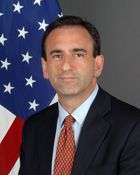Philip Gordon
Philip H. "Phil" Gordon (born 1962) is an American diplomat and foreign policy expert. From 2013 to 2015, Gordon served in the White House as Special Assistant to the President and White House Coordinator for the Middle East, North Africa, and the Persian Gulf Region.[1] From 2009 to 2013 he served as Assistant Secretary of State for European and Eurasian Affairs.

Gordon is currently the Mary and David Boies senior fellow in U.S. foreign policy at the Council on Foreign Relations, where he focuses on US foreign policy, the Middle East, and Europe. He is also a Senior Adviser at Albright Stonebridge Group.[2]
Education
He received his Ph.D. in international relations and international economics from the Johns Hopkins University School of Advanced International Studies (SAIS) in 1991. He also received an M.A. from SAIS in 1987 and a B.A. from Ohio University in 1984.[3]
Career
Teaching career
Gordon held a number of research and teaching positions, including at the Brookings Institution in Washington, D.C.; the International Institute for Strategic Studies in London; INSEAD, the global graduate business school in Fontainebleau; and the Deutsche Gesellschaft für Auswärtige Politik in Bonn.[4]
Clinton administration
From 1998 to 1999, he served as the Director for European Affairs at the National Security Council under President Bill Clinton.[4]
Obama administration
He was Special Assistant to the President and White House Coordinator for the Middle East, North Africa, and the Gulf Region from 2013 to 2015. As the most senior White House official focused on the greater Middle East, he worked closely with the president, secretary of state, and national security advisor on issues including the Iranian nuclear program, Middle East peace negotiations, the conflict in Syria, security in Iraq, U.S. relations with the Gulf states, political developments North Africa, and bilateral relations with Israel, Egypt, Jordan, and Lebanon.
He chaired numerous interagency processes, regularly engaged foreign leaders, and directed a staff of some 20 directors and other national security specialists.[4]
Prior to joining the National Security Council staff, he served as Assistant Secretary of State for European and Eurasian Affairs under Secretary of State Hillary Clinton from May 2009 to March 2013. Working closely with the Secretary of State, his priorities for the region included cooperating with Europe on global issues; promoting U.S. commercial and business interests; extending stability, prosperity and democracy to Eastern Europe, the Balkans and the Caucasus; and developing bilateral cooperation with Russia and with Turkey.[4]
He was the principal architect of the Obama administration's 2009 attempt to elevate relations with Turkey.
Current
He joined the Council on Foreign Relations in April 2015 as a senior fellow focused on U.S. foreign and national security policy; U.S. policy in the Middle East; Israeli-Palestinian issues; Middle East regional issues; Europe and the EU; Russia; Turkey; nuclear weapons; intelligence; terrorism; and international economics.[5]
Publications
Gordon has published articles in The New York Times, Washington Post, Politico, the Atlantic, Financial Times, Wall Street Journal, Foreign Affairs, Foreign Policy, Le Monde, and elsewhere.
He has also authored several books, including:
- Losing the Long Game: The False Promise of Regime Change in the Middle East, forthcoming, 2020
- Winning the Right War: The Path to Security for America and the World, 2008
- Winning Turkey: How America, Europe, And Turkey Can Revive A Fading Partnership (with Omer Taspinar), 2008
- History Strikes Back: How States, Nations, And Conflicts Are Shaping The Twenty-first Century, ed., (with Hubert Vedrine and Madeleine Albright), 2008
- Crescent of Crisis: US-European Strategy for the Middle East, ed., (with Ivo Daalder and Nicole Gnesotto), 2006
- Allies at War: The United States, Europe, and the Crisis Over Iraq (with Jeremy Shapiro), 2004
- The French Challenge: Adapting to Globalization (with Sophie Meunier), 2001
- Cold War Statesmen Confront the Bomb, ed. (with John Lewis Gaddis, Ernest R. May and Jonathan Rosenberg), 1999
- NATO's Transformation, ed., 1997
- France, Germany and the Western Alliance, 1995
- A Certain Idea of France, 1993
He has also translated two books: Nicolas Sarkozy's Testimony: France, Europe, and the World in the Twenty-First Century, 2007, and Hubert Vedrine's France in the Age of Globalization, 2001.
References
| Wikimedia Commons has media related to Philip H. Gordon. |
- "White House Announces New Coordinator for the Middle East, North Africa, and the Gulf Region". White House website. Retrieved May 3, 2014.
- "Philip Gordon, Albright Stonebridge Group". Albright Stonebridge Group website. Retrieved July 25, 2016.
- "Philip Gordon - Council on Foreign Relations". Cfr.org. Retrieved 2015-07-03.
- "Philip Gordon - Council on Foreign Relations". Cfr.org. Retrieved 2015-07-03.
- "Philip Gordon Joins CFR As Senior Fellow - Council on Foreign Relations". Cfr.org. Retrieved 2015-07-03.
External links
| Government offices | ||
|---|---|---|
| Preceded by Daniel Fried |
Assistant Secretary of State for European and Eurasian Affairs May 15, 2009 – March 11, 2013 |
Succeeded by Victoria Nuland |